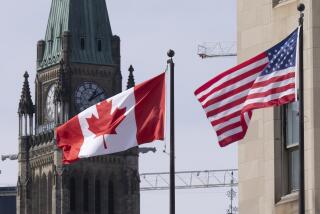Service Disruptions Possible in the Bahamas
- Share via
World Travel Watch is a monthly report designed to help you make informed judgments about travel. Because conditions can change overnight, always make your own inquiries before you leave home. For more information on safety concerns in countries you may be visiting, contact the Citizens Emergency Center, U.S. Department of State, Washington, D.C. 20520, (202) 647-5225.
Caribbean
Bahamas: Though the Bahamas did not bear the brunt of Hurricane Andrew, the U.S. Department of State has authorized the voluntary departure of non-essential personnel and dependents due to the potential for supply shortages and the disruption of essential services. Flights leaving the area are heavily booked at this time. Travelers contemplating a visit to the Bahamas should be sure to confirm their travel and lodging arrangements before leaving the United States.
Latin America
Belize: Travelers to Belize City should exercise caution against street crime. Walking alone at night is discouraged, and travel to remote inland tourist sites should be done only in a group.
Colombia: Several major drug traffickers escaped from a Colombian prison in July. According to the State Department, this escape increases the threat to U.S. government interests in Colombia, and the American Embassy is curtailing non-essential travel to Colombia by government personnel. Private citizens traveling to Colombia should register with the U.S. Embassy on arrival.
Asia
Indonesia: Travel throughout most of this archipelago is generally safe, but Aceh Province, on the northern tip of Sumatra, has been the site of civil unrest and isolated incidents of violence in the past year. A special permit must be obtained for travel to the province of Irian Jaya, the western half of the island of New Guinea.
East Timor, an island territory that Indonesia annexed in 1975, has experienced periodic unrest since that time as locals resist what they consider subjugation of their independent nation.
Nepal: The State Department has canceled the advisory it issued in April after several days of unrest in the Katmandu Valley. The political situation in Nepal is calm again and tourism is back to normal.
Thailand: According to an Aug. 21 report in the Bangkok Post, the operators of a tour bus catering to foreigners gave their passengers drugged soft drinks, then stole their valuables while they slept. Incidents of this kind are not uncommon, but usually the victims have been drugged and robbed by other passengers, not by the tour bus operators.
Middle East
The State Department has issued a regional travel advisory alerting Americans to the possibility of hostile acts against the U.S. government and its citizens, in response to increasing tensions with Iraq due to Iraq’s defiance of U.N. Security Council resolutions.
Turkey: Hostilities between Turkish security forces and Kurds fighting for an independent homeland have intensified in recent months in southeastern Turkey. More than 1,000 Kurdish separatists battled security forces in the town of Sirnak on Aug. 20. Travel to southeastern Turkey should be undertaken with caution. The area around Sirnak--about 750 miles from Istanbul, just north of the Iraqi border--should be avoided.
Africa
Algeria: A powerful bomb exploded in a crowded terminal at Houari Boumedienne Airport in Algiers on Aug. 26, killing nine and injuring more than 100. A second bomb exploded at an Air France office and a third was defused at a Swissair office. The incidents mark the first terrorist attacks since the government canceled elections in January and banned a popular Islamic political party. All travel to Algeria should be undertaken with caution.
Niger: According to the State Department, crime has increased dramatically in recent months in the capital city of Niamey. Thieves and pickpockets are especially active in tourist areas, and armed robberies are common. Travelers should use vehicles for all travel within the city because the streets are not safe for walking.
Travel to the desert areas of northern Niger also should be avoided due to ongoing banditry, including attacks on government posts and armed robberies of travelers. The areas bordering Mali and Algeria should be avoided; the government has closed the border to tourists entering from Algeria.
Burundi: Crime is high in the capital city of Bujumbura, and can occur anywhere in the city. Roads bordering popular Lake Tanganyika are especially dangerous for persons walking alone. The borders with Rwanda, Tanzania and Zaire are currently open, but can be closed without warning at any time. Travelers wishing to cross into Zaire for gorilla viewing, via the Luhwa-Ruwa crossing in Cibitoke province, must notify the government of Burundi in advance.
Senegal: Separatists are again active in the Ziguinchor region of western Casamance. There have been reports of roadblocks and incidents of violence, and the government has increased the security presence in the region.
More to Read
Sign up for The Wild
We’ll help you find the best places to hike, bike and run, as well as the perfect silent spots for meditation and yoga.
You may occasionally receive promotional content from the Los Angeles Times.






